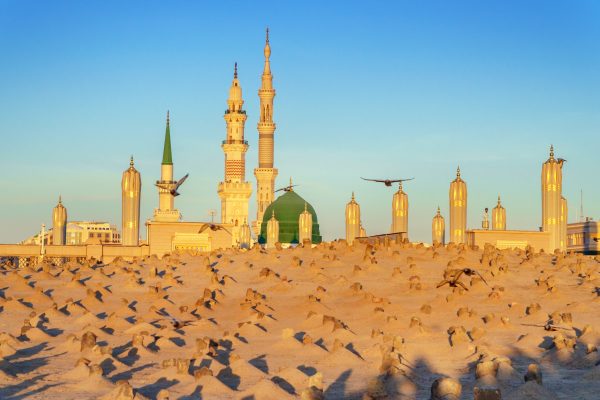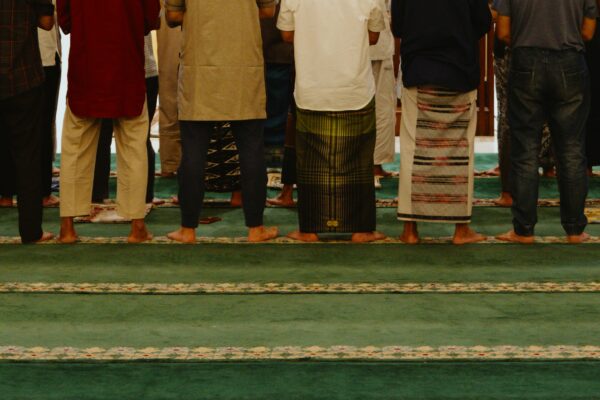We don’t highlight examples of how the first shaheed of the Battle of Badr was Mihijar (RA), described as a black man. Or that the Prophet (pbuh) made a point of describing Umm Ayman (RA), a black former slave as “my mother after my mother”. Or the significance of the first martyr of Islam being a black woman. Or the fact that the adopted son of the Prophet (pbuh), Zaid (RA), was known to be black.
We don’t highlight examples of how the first shaheed of the Battle of Badr was Mihijar (RA), described as a black man. Or that the Prophet (pbuh) made a point of describing Umm Ayman (RA), a black former slave as “my mother after my mother”. Or the significance of the first martyr of Islam being a black woman. Or the fact that the adopted son of the Prophet (pbuh), Zaid (RA), was known to be black.
Muslim Census recently published a small study consisting of 250 non-Black Muslims in 2020 asking about their views and perception of anti-Black racism in the British Muslim communities. They state themselves that the limitations of the study were the sample size, the fact that the bulk of the participants were below the age of 30, and that most of them were from South-Asian communities. However, it still gives anecdotal information that confirms and corroborates the many testimonies of Black Muslims that are largely ignored by non-Black Muslim communities.
Here are just a few examples:
“My father-in-law refuses to pray at the mosque when it’s a black imam leading the prayer. He makes comments about they are not ‘real Muslims’ just because they may follow a different madhab from us.” – Response 207
“In my local mosque, it’s usually full of Bangladeshis and some Pakistanis. On occasion we have black brothers pray there too and they get a lot of stares and hushed comments.” – Response 186
“You hear the older generation all the time using racial slurs when black Muslims come to the mosque.” – Response 227
The report also shows that the sample widely acknowledges racism within British Muslim communities as a real problem and that more should be done.
Another report published this year too by the Black Muslim Forum illustrates Black Muslim voices on the same issues that align with the Muslim Census data. Needless to say, Black Muslims have been telling us of their experiences of racism within our communities for years.
Time and time again these problems are brought up in the public space and it is met with denial or at the very least allocating equal blame on Black Muslims for that disunity. And time and time again, that backlash ironically involves the use of overt racist words and stereotypes, just as white supremacists behave with their “All Lives Matter” rhetoric.
This is still a problem and one that is much larger than we think.
Not Just Haram
Ibn Qayyim is recorded in stating plainly and strictly that racism is a form shirk because it denies the spiritual equality of fellow human beings. It enforces a view that some humans are somehow inherently inferior, and that Allah did not put the same fitra inside everyone. That somehow Allah did His task without perfection and with error.
In turn, it violates the fundamental tenant of Tawheed, the Oneness of Allah, asserting equally that all humans are equal under One God, and whilst we talk about Tawheed largely in abstract and spiritual spaces and circles, we never talk about the social ramifications of this violation.
People, communities, and nations manifest this violation in their tribalism, nationalism, elitism, classism, misogyny and, yes, in their racism. In that, the injustices and inequalities that Islam firmly attempted to cleanse are normalised and rooted in their structures and culture. That Jahiliya becomes more dominant than the truth of Tawheed and the equality it asserts. Even if people speak the truth of Tawheed with their tongue, their behaviour and culture simultaneously betray it. Our racism exposes that hypocrisy.
Whilst some may argue that the focus is not about the inherent human value, but rather about problematic cultures, the fact that they associate those racialised stereotypes with certain races and not others asserts how little understanding they have of modern-day racism and their own internalised racism as people of colour. It is as if 20 years of Islamophobia taught us nothing.
Abu Ibraheem’s comments about drug culture and Jamaicans or the “let’s stop talking like we are Black. Let’s talk in a decent way” comments, illustrate just that. In one sentence, it denigrates not just the humanness of Black Lives, but also the legacy of Blackness within our own Islamic history. And this is a man giving Dawah publicly. Imam Yusuf Rios’s response to this goes deeper of how we as Muslims in the West never talk about racism as it should be.
The response to being confronted is always one whereby, even if they do apologise, they try and muddy the waters by saying “Black Muslims are problematic too” to save some face. A behaviour that Black people are all too familiar with because of White institutions, whether they are companies, universities, or state organisations. The excuses, deflection, and denial only show that we are unwilling to confront ourselves and clean this shirk from our hearts and communities. The defence of people like Abu Ibraheem by South Asians only reinforce this.
No Justice. No Peace.
There has been a centuries-long scholarly tradition, a thumb-of-rule if you will, to address the ugliness of injustice before we call for the virtue of Ihsaan.
Imam al Qurtubi wrote all the way back in the Islamic Golden Age that the distribution and implementation of the mechanisms for justice is a priority above pursuing the change or reform of justice. That can only come from leadership and from institutions. Furthermore, that reform takes precedent above the calling of Ihsaan, because Ihsaan cannot flourish where injustice is present.
What we do today is the polar opposite. We criticise Black Muslim communities for creating their own spaces, demanding they show Ihsan by continuing to be patient with our racism, while never taking action to deal and deny their experiences that come from that very same ugliness. Why do we assert such expectations? South Asians and Arabs wouldn’t tolerate the same disrespect and dehumanisation.
The onus is on us to cleanse this ugliness in our structures, culture, families, and ourselves, even before we start asking our Black brothers and sisters to Ihsan. The reason we got it upside down is that fundamentally, our priority is not unity and cleansing our hearts or standing up for Islam, but rather protecting our collective nafs.
Islam: The Anti-Racist Religion
Perhaps one of the clearest anti-racist incidents in our tradition was under Umar bin Khattab’s (RA) rulership when a Muslim army was sent to siege a Babylonian fortress in Cairo in 641 AD.
Ubadah ibn Assamit (RA) was one of the first of the Ansar and was given the position of Kutab al Wahi (writer of the revelation sent down to the Prophet (pbuh) – accompanying the Prophet (pbuh) in every battle and described in the tradition as a black man.
The leader of the Babylonian, al-Muqawqis, in response to the siege, asked for a delegation to negotiate. General Amr ibn Al-‘As sent a delegation of ten men, headed by Ubadah ibn Assamit, to speak with al-Muqawqis. Alarmed by Ubadah’s black appearance, al-Muqawqis said: “take this black man away from me and let someone else come and speak to me!”
The Muslim delegation replied: “This black man is the best of us in knowledge and wisdom. He is our leader and the best of us, and has been appointed over us. We all refer to his opinion, and our leader has appointed him over us and ordered us not to go against him. And to us, a black man and a white man are the same!”
Al Muqawqis demand the same thing again, and the Muslims replied in kind.
In resignation, Al-Muqawqis said to Ubadah, “Come forward, O black man, and speak to me gently, for your blackness alarms me, and if you speak harshly that will alarm me further.”
Ubadah stepped forward and said, “I have heard what you said. Among my companions whom I left behind are a thousand men who are all as black as me, and even blacker than me and more terrifying to behold. If you saw them you would be even more alarmed. My youth has gone, but nevertheless I would not be scared if one hundred men of my enemy wanted to face me all at once, and the same is true of my companions, for our hope and our desire is to strive in jihad for the sake of Allah, seeking the pleasure of Allah…”
There was no relenting or reasonableness by the Muslims with respect to Al-Muqawqis prejudice. They asserted their anti-racist position despite the gravity of the situation and position of Al Muqawqis himself. Also, Ubadah himself was clearly revelling in the situation. He was not diminished or insecure at all. In fact the very opposite, he boldly confronted and utilised Al-Muqawqis’s prejudice to his advantage, knowing he was empowered by Islam and the entire Muslim army behind him.
Imagine how empowered our Black brothers and sisters would be when facing white supremacy if we had their back in the same way. What makes it even more remarkable is that this transformation only took a single generation for the Prophet (pbuh) to make his followers understand that this is a matter of Tawheed. You cannot be Muslim while justifying racism.
Yet, it is our own prejudices against Black Muslims (and Black people overall) that stops us from replicating the example of the Sahaba and the Prophet (pbuh). It even stops us from educating ourselves about it.
We talk about Bilal (RA) being the first Muazzain, but not that he was appointed as the Head of the Treasury by the Prophet (pbuh). Why? We also don’t state that it was the Prophet (pbuh) who ensured Bilal (RA), an Abyssinian former slave, married Halaa bint Awf, who was from a noble Arab family – something South Asian and Arab families today would cut family ties and risk Jahannam over.
We don’t highlight examples of how the first shaheed of the Battle of Badr was Mihijar (RA), described as a black man. Or that the Prophet (pbuh) made a point of describing Umm Ayman (RA), a black former slave as “my mother after my mother”. Or the significance of the first martyr of Islam being a black woman. Or the fact that the adopted son of the Prophet (pbuh), Zaid (RA), was known to be black.
We don’t teach that the Prophet (pbuh) appointed Usama ibn Zayed as the general of the army. A 17-year-old who is described in Abu Dawood as “blackest of black”. And the complaints by some of the Sahaba was about his age, never about his blackness.
All of this has structural, cultural, social, physical and emotional penetrations of anti-blackness, during a time where the concept of racial privilege was inconceivable.
Regardless of whether we don’t acknowledge these examples because the presence of empowered blackness during the Seerah (and our entire history) has been erased, or if previous Muslim civilisations simply understood anti-racism so well that it was never needed, what is clear is that it was as serious a problem at the time of the Prophet (pbuh) as it is today. So should we not educate our communities today as the Prophet (pbuh) did back then?
Broken Institutions Creating Broken Muslims
If every masjid, charity, and voluntary campaign organisations took the same example of the Prophet (pbuh), we could have the same dramatic and radical transformation. A complete re-education and re-organising of our communities is possible, but only if we are willing to confront it.
For over a century we have ignored Islamic fundamentals of social justice as part of madrassa or wider social education. The impacts of this has been more internal division to the point that we are, as the infamous hadith states, “many in number” but the “troth on the water”.
But we do not even have the culture and mechanisms to enforce that necessary change. The culture of privilege and being devoid of accountability in our masjids and other Islamic institutions make even the most practical solutions difficult at best. And the masjids, in particular, are the hearts of our communities. Whatever happens in the masjid, happens in the communities.
Allah has connected truth with justice so closely, that our submission to the truth means we are mandated to be people of justice and be accountable for it. We cannot run away from this as we have for so long. It has caused division and weakness in our global situation and within our own hearts. And if we don’t do what we can in this world to confront the issue, we certainly cannot run away from it on the Day of Judgement.
Even if it is for the sake of our own souls, we must restlessly demand the accountability in our institutions and the education for our masses that is necessary to do away with this most filthiest of social and spiritual diseases.





